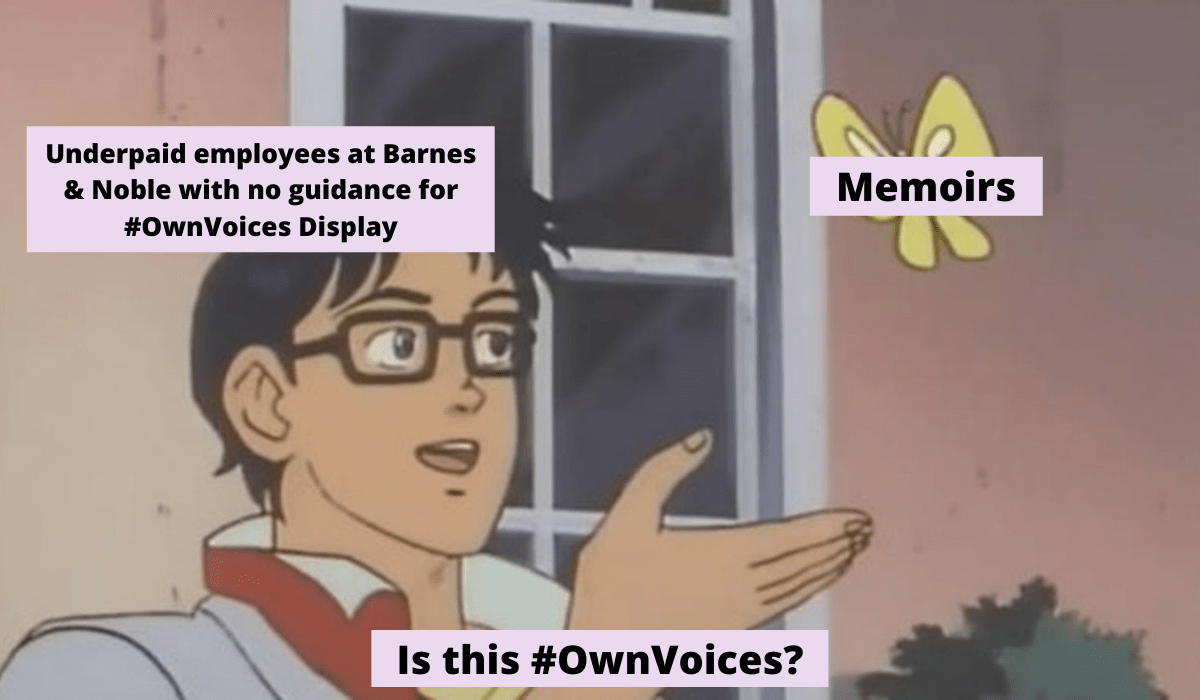The discourse around #OwnVoices has changed a lot over the last six or seven years. To put it simply (for now), #OwnVoices generally refers to fiction novels featuring locations and characters of a specific background written by authors of a similar experience. The idea is to uplift those marginalized due to their race, ethnicity, sexuality, ability, nationality, religion, and more, because the publishing industry and booksellers often pour resources into those outside of these communities to tell their stories. (Or “flood” in the case of Jeanine Cummins’ American Dirt.)
At no point was it ever a term to describe non-fiction autobiographies and memoirs in general, especially those unrelated to marginalization in any way. Unfortunately, a Barnes & Noble tasked with setting up an #OwnVoices table didn’t get the memo.
How did this even happen
In addition to the issue of fiction vs. non-fiction, we know there is a big gap in understanding. Even the books in the entire (cropped) picture, shared by author Ivelisse Housman (which shows about half of the table), aren’t very diverse.
One commenter (not from the exact location) said that Barnes & Noble’s corporate office no longer sends employees a list of books to include for their table signs. This decentralization allows individual stores to pick books based on their communities’ needs, which is probably a net good because they’ll know their community best. This is why those on BookTok see different Barnes & Nobles accounts depending on the location, too.
Unfortunately, these already underpaid (most are making minimum wage or a dollar above it in their states) employees of the largest brick-and-mortar bookseller chain probably don’t have the time, while at work, to figure out what this term means.
They won’t know about #OwnVoices unless they are in a community with other bookish people online. That’s why, despite corporate putting the work on the employees, I’m not going to sit here and be fully upset with this particular store location.
Barnes & Noble (if they are going to continue to use #OwnVoices) should rotate out a subtopic for stores based on identity and use their vast resources (not this) to provide guidance to the stores. Additionally, continual DEI training for a more diverse and fair-waged staff would help mitigate mistakes like this, if for no other reason than to boost sales by appealing to an ever-diversifying public that will choose alternatives.
Why are people ditching the term altogether
This misuse is emblematic of the phrase becoming more and more diluted over time, after publishers and chain stores got hold of it. On June 6, 2021, the advocacy group We Need Diverse Books released a statement explaining why they decided to step away from using the term, too. They wrote:
#OwnVoices was created as a hashtag by author Corinne Duyvis in September 2015. It was originally intended as a shorthand book recommendation tool in a Twitter thread, for readers to recommend books by authors who openly shared the diverse identity of their main characters. The hashtag was never intended to be used in a broader capacity, but it has since expanded in its use to become a “catch all” marketing term by the publishing industry. Using #OwnVoices in this capacity raises issues due to the vagueness of the term, which has then been used to place diverse creators in uncomfortable and potentially unsafe situations. It is important to use the language that authors want to celebrate about themselves and their characters.
These “uncomfortable and potentially unsafe situations” include circumstances like authors who aren’t publicly “out” in some capacity, due to safety, being excluded from the positive uplift intended by #OwnVoices. Another example I’ve seen is feuds within diasporas as the disconnect grows between authorial intent and marketing (by the publisher) motivation to appear inclusive.
There continue to be many more conversations going on about whether #OwnVoices is doing more harm than good. Regardless, in all of these situations, people tend to at least be on the same page that we’re talking about fictional narratives and marginalization, not Hunter Biden’s memoir.
(via Twitter, image: Alyssa Shotwell)
—The Mary Sue has a strict comment policy that forbids, but is not limited to, personal insults toward anyone, hate speech, and trolling.—










Published: Feb 7, 2022 05:34 pm